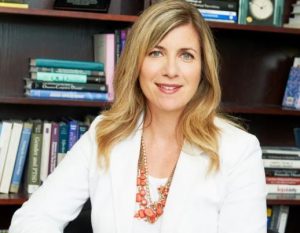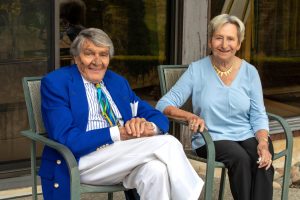Services available to cleaners, administrators as well as nurses and doctors
Dan Taekema · CBC News · May 06, 2020

Randi McCabe is a clinical psychologist at St. Joseph’s Healthcare Hamilton who helped design mental health services for health and community-care workers.
St. Joseph’s Healthcare Hamilton has a message for anyone working on the front line of the COVID-19 pandemic: “You don’t have to suffer alone.”
The hospital system is stepping up as the regional lead for mental health support, covering the city and everything west of it and offering those dealing directly with the pandemic — in any setting or role —someone to talk to.
“We’re really talking about anybody who’s on that front line. It could be housekeeping staff … nutrition staff, admin staff checking people in at the door,” said Randi McCabe, a clinical psychologist at St. Joe’s. “It could be people working in shelters or hospice.”
McCabe’s family knows how stressful and scary the virus can be. Her husband works on a COVID-19 unit and whenever he comes home he makes sure to wash his clothes and shower before speaking with his loved ones, she said.
The possibility of passing along the virus is a source of anxiety others who have continued to work through the pandemic also share.
“There’s a big fear of contaminating their family,” explained McCabe. “The stress of ‘Well how do I keep myself separate from my family? Am I cleaning myself enough?'”
Concerns about people’s own health and safety as well as exhaustion from working in a setting, such as a long-term care home, that doesn’t have enough staff also create a “huge burden of stress,” she said.
Then there’s the weight of trying to treat someone with the virus only to watch them die.
“It’s very painful emotionally to be involved when someone actually passes away from COVID,” said McCabe. “It’s very sad.”
The province announced Tuesday it was expanding virtual mental health services.
“In order to help stop the spread of this deadly virus our frontline workers are working long hours in stressful situations and people across the province are doing their part by staying home, in many cases alone,” stated Health Minister Christine Elliott in a media release.
“We know these actions are not easy and can cause stress, anxiety and other mental health issues. That’s why we are providing virtual mental health supports, allowing people to get the help they need while still physically distancing.”
St. Joe’s has partnered with the Canadian Mental Health Association to determine what support is best for each individual who calls in or fills out an online intake form.
Services include self-help, counselling by phone or online, peer-to-peer support and in-person visits for those in crisis.
Anyone who’s finding their sleep, appetite or relationships with loved ones affected by the stress of their role is encouraged to reach out.
The pandemic has introduced a “new abnormal,” said McCabe, and chances are it will last until a vaccine can be found. That means the stress will be sticking around too.
“This isn’t going anywhere and it’s actually going to change how we do things for quite a ways to come,” she added.
“There is help and hopefully some relief for people if they’re suffering from the effects of their stressful positions right now.”
BY DON MITCHELL GLOBAL NEWS
Two well-known philanthropists are set to give Hamilton health researchers a $3.3-million boost to help fund urgent research projects connected to the COVID-19 pandemic and mental health.
In a letter to the community, Charles and Margaret Juravinski say they are donating funds to free everyone from the “terrible virus,” and allow the public to “live and move about without fear of spreading or picking it up.”
“Like everyone, we are deeply troubled by the fearsome threat of COVID-19, which has truly changed the world in just a few months,” the couple said in their letter.
“We are concerned not for ourselves, but for the people around us: our friends and family, our neighbours near and far, the people who work in our community’s grocery stores, restaurants and hospitals and the kids who should be out playing in our schoolyards.”
The money is an advance on a pledge made in May when the couple promised to divide their $100-million estate between Hamilton Health Sciences, McMaster University and St. Joseph’s Healthcare Hamilton, a gift they say would generate up to $5 million annually for the three agencies under the banner of the Juravinski Research Institute.
Charles, 90, and Margaret, 88, known for endowments with a number of projects connected to the city, McMaster University, and healthcare, compare the COVID-19 pandemic to a number of “frightening problems” they experienced during their lifetime including the Great Depression, the Second World War and the scourge of polio.
“Our wish is that it may inspire hope,” the couple said of the donation, “We hope it will produce results that benefit people immediately. We urge others to find ways to give what they can.”
In a joint statement, Hamilton Health Sciences, McMaster University and St. Joseph’s Healthcare Hamilton say the funding will support eight collaborative research projects which include:
- A study on the effectiveness of N95 respirators or medical masks
- A three-part study on the impact of the pandemic on hospital emergency departments and staff
- speed up of diagnostic testing protocols for viral pathogens responsible for the COVID-19 using robotics
- An age-related study of 50,000 people ages 45 to 85 to close in on factors that appear to protect against or increase the risk of developing symptoms connected to COVID-19
- COVID-19 repository for storing human biological samples
The money is also earmarked for three mental health projects including a study on the impact of substance use in relation to the brain development of young adults, technology to identify brain anomalies following a mild traumatic brain injury, and AI technologies offering data on potential treatments to aid youth mental health.
Two Hamilton researchers will study post traumatic stress in emergency services
Media Outlet: Hamilton Spectator | Date: February 14, 2019 | Reporter: Joanna Frketich
Hamilton researchers are teaming up with scientists in France to determine the links between mind and body that could one day bring about more personalized mental health treatments.
“The hope for the patients one day is that when they come with depression, we don’t give them only an anti-depressant,” said Dr. Flávio Kapczinski, professor of psychiatry at McMaster University and St. Joseph’s Healthcare.
“We give them a whole strategy on how they would get outside the risk zone for depression.
“We could give them exercise, correct their metabolism with some sort of diet and give them anti-inflammatories.”
The partnership with the Pasteur Institute was one of three new Hamilton mental health projects launched in February.
The other two will investigate post-traumatic stress injuries (PTSI) in public safety personal such as firefighters, paramedics, police officers and correctional workers.
Both received grants of up to $150,000 from the Canadian Institutes of Health Research as part of $2.95 million in federal funding announced Feb. 8 to studies that increase understanding of how to identify, treat and prevent PTSI.
Margaret McKinnon, chair in mental health and trauma at McMaster, will do a randomized control trial to test a new way to treat PTSI in public safety personal with other health conditions.
Occupational therapist Sandra Moll plans to design a mobile health approach to prevention and peer support.
“Public safety personnel put themselves in harm’s way to protect Canadians, putting them disproportionately at risk of post-traumatic stress injuries,” federal minister of public safety and emergency preparedness Ralph Goodale said in a statement.
“Our country must do more to protect the mental well-being of public safety officers on-the-job. The initiatives will help address gaps in PTSI research and inform long-term plans to support the mental health and well-being of our public safety personnel.”
Meanwhile, the new partnership with the French researchers is significant because it gives St. Joseph’s Healthcare and McMaster access to basic science research that they don’t have now.
In turn, they offer Pasteur large cohorts of patients from West 5th hospital that the French are currently missing.
“We are accumulating a lot of data in this field now and thanks to this collaboration we’re going to have access to large cohorts,” head of Pasteur’s perception and memory unit Dr. Pierre-Marie Lledo said during a trip to Hamilton on Feb 7.
“We get a full picture of how the brain functions by having access to the clinical data.”
It’s also unique because French researchers generally team up with Quebec investigators.
“When France would partner with Canada they never crossed the Gatineau River,” said Kapczinski.
“Now the commitment of the French Embassy is to bring to the attention of French scientists this whole perspective of dealing with many other centres like McMaster. We are looking to the idea of strengthening the scientific links between Canada and France.”
So far, funding is primarily from their own institutions and the French Embassy, but they are working on applying for grants to study many different potential mind and body links.
“We were finding our patients when they have depression, they have a lot of inflammation in their blood,” said Kapczinski.
“We didn’t know the cause of that. Pasteur is famous because it’s where immunology and inflammation started to be understood … so we reached out to the director and he was very excited.”
Other questions vary from gut bacteria to exercise to metabolism to electric signalling between fatty tissues of the brain.
“People who suffer from depression they suffer a lot of brain changes like accelerated aging,” said Kapczinski.
“The brain and the body as a whole starts to age faster and we want to understand the mechanisms associated with that.”


